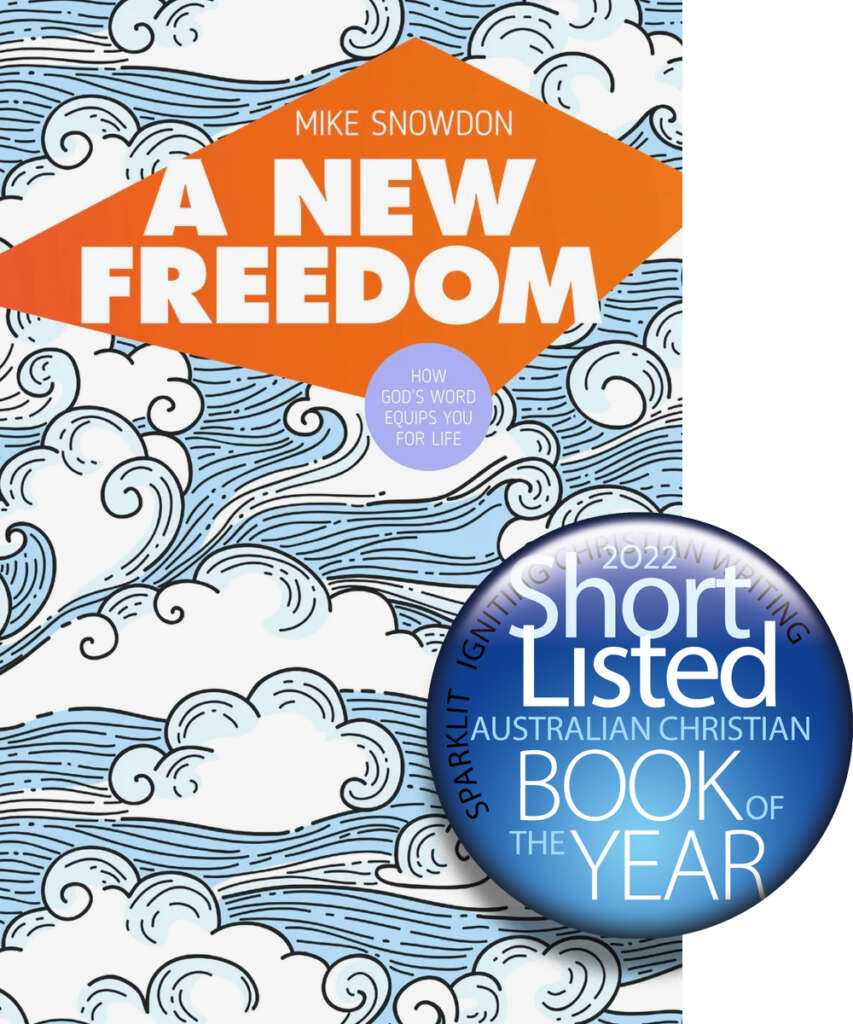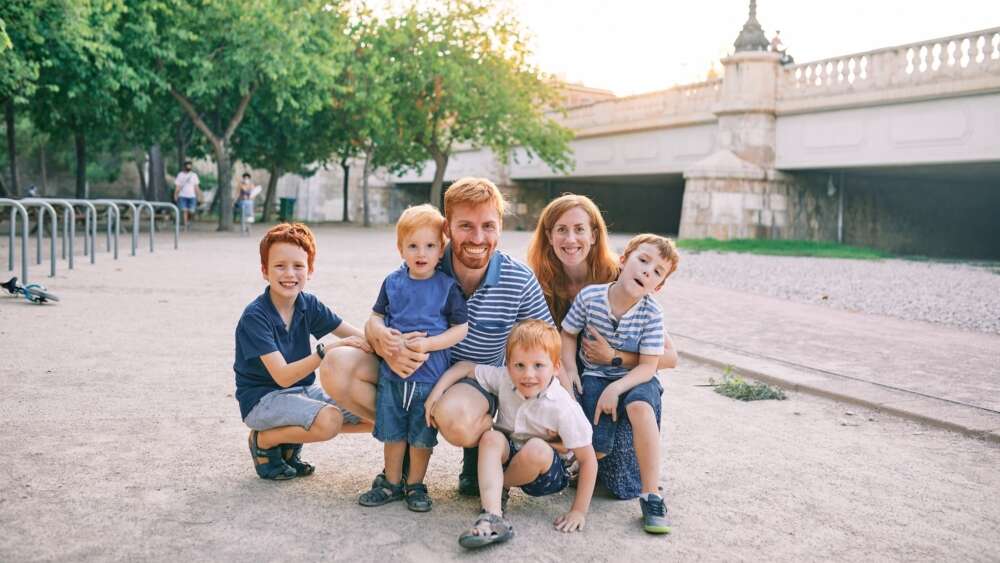Remember those pesky QR codes that we had to scan to log in at shops and restaurants during COVID? Well, in yet another example of God bringing good things out of the negativity of COVID, those same QR codes are now being used as an everyday way of accessing video material through text.
You may have used them to give feedback on a church service, as we do at my church. And this week I discovered the joy of breaking up my reading of a new book for Christian teens by scanning lots of QR codes which took me straight to fun videos by the author, which really took the experience to a new level.
In A New Freedom: How God’s Word Equips You For Life, Mike Snowdon makes use of the fact that most kids these days do everything with their devices by their side.
This offered the former Church Missionary Society missionary in Valencia, Spain, a way to break up the reading experience with videos to make the material as fun and engaging as possible for teenagers.
“I love making videos and I wanted the book to be as engaging as possible.”
While the arrival of the pandemic slowed down the publication of the book for a couple of years, that very slowness proved a blessing because it allowed the material to become much better – and more accessible.
“Originally we were trying to think how could you get access to video in a book, other than just providing a link – because we don’t have Harry Potter magic or crazy futuristic technology,” says Mike.
“QR codes gave me a chance to bring as many different creative elements as I could. I love making videos and I wanted the book to be as engaging as possible or to be accessible to as many different types of people as possible who might not necessarily always read a straight textbook.”
The videos range from animated readings of Bible extracts through to a rather disgusting demonstration of sin as Mike peels and eats a banana then reverses the process to put the banana back together again. There is even an energetic “Panaerobics” video that provides a funky overview of the Bible that Mike created as a group warm-up at his church in Spain.
“They were confronting a world, both in the media and in their school amongst their friends, that was more and more hostile to Christianity.”
Mike is speaking to Eternity from his home in Sydney, where he and his family – wife Tania and four boys – returned earlier this year after serving for 10 years in Spain, where they helped young people meet Jesus. He is now the youth and young adults minister at Willoughby Park Anglican Church.
But the book stems from his experiences working with youth in Valencia, where he observed that Christian teens were being confused by messages from the media and their friends that undermined their belief that God’s word was good for them.
“A really significant thing for me was meeting lots of these teenagers in Spain who had grown up in churches that had loved them, cared for them, and taught something of God’s word. They were confronting a world, both in the media and in their school amongst their friends, that was more and more hostile to Christianity,” Mike explains.
“It wasn’t that people, their friends and the media, were no longer just saying that, ‘Oh, we don’t think the Bible’s true’; they were starting to say that maybe Jesus wasn’t actually good, that he was hateful and they were coming up with reasons for that too.
“And they’d say ‘How come you’re always saying no to people, how come it feels like this oppressive thing where you are trying to make people fit into your mould?’ They’d accuse Christians of always saying no. And then they’d say, ‘But look at what we’ve got to offer. We’ve got this fairness for all people where you are free to try things, you’re free to be yourself to pursue your desires.’ That sounds really attractive, particularly to these teenagers where they’re seeing a negative idea of Christian things and they maybe start to even feel that a bit, particularly as their friends pull up a verse from the Old Testament that they haven’t encountered before.
“And they go, ‘Oh, this does sound like the kind of God that they’re describing.’ So they start to doubt the goodness of God’s word, but they’re also presented with what feels like a freer world, something that sounds really attractive. So I had heard lots of that and would be thinking about that myself and think, ‘Why have I come to the stage of actually seeing that God’s word is good, but how am I also communicating that? Because I hear these things about justice and fairness and goodness, and I think those are Christian things. God is love – that’s where you see love and all these things.’ So that fuelled a stronger passion to not only say ‘God’s word is true, but God’s word is good.’ And to show how these things of justice do find their true fulfilment in God, and the way that you’re going to see that is in Jesus as the one who reveals God.”
“Confidence in the goodness of God’s word, not just for us but for our world, does actually allow us complete freedom.”
Mike used the word “freedom” to encapsulate these ideas because at the heart of a lot of accusations against Christianity is the idea that we are enslaved to something.
“I want to counter that and say, ‘No, that’s not slavery. What we’re actually seeing here is true freedom if you take a chance to see it through Jesus. And that kind of confidence in the goodness of God’s word, not just for us but for our world, does actually allow us complete freedom beyond anything that the world can offer us. That’s incredibly liberating. And is exciting for someone who can grasp, but to then keep going in Jesus for the rest of their life.”
 A New Freedom – another title shortlisted for Australian Christian Book of the Year – explores ways and methods that Christian teens can use to approach ethical issues and ethical discussion in a biblical way, giving practical examples of how to use this framework to think about six key youth topics – study, money, suffering, violence, sex and identity.
A New Freedom – another title shortlisted for Australian Christian Book of the Year – explores ways and methods that Christian teens can use to approach ethical issues and ethical discussion in a biblical way, giving practical examples of how to use this framework to think about six key youth topics – study, money, suffering, violence, sex and identity.
It’s meant to be a training manual in that it’s a lifelong endeavour to live a unified way of life as Christians in the modern world. And the way to do that is by reading the Bible, not just by pulling one verse out and trying to create a justified whole but by reading the whole book through a supporting structure that provides a way of organising the information to see if there are unexpected holes but also a way that helps us to correspond with the world.
During the process, Mike shared as much of his life as he could in order to be transparent with his readers.
“For me, it’s very important to remember, both in terms of who they are but also how we minister to them, that they can detect if you’re being genuine or not. You can’t hide from them. And teenagers are very used to being talked down to or treated as children who are younger, rather than being people who are developing into adults. So they’re looking for someone to walk alongside them, rather than continue to speak down to them. I didn’t want to speak down to them in my book. And I wanted to make sure that anything I was sharing or suggesting I’d first applied to myself. And so I would try to then talk from my experiences and my stories. I hope that’s resulted in something that’s quite open.
“As you come to the chapters on suffering and identity, then it starts to get more serious in terms of the examples and things that I share from my own life, but all of that is done in reflection on God’s word. And in such a way where I think I can genuinely say, and even from those examples, that I am definitely very committed to the fact that God’s word is good and it’s good for me. It’s good for our world. It’s good for these teenagers. And so sharing lots of those things was for me, a really important part of getting that across. They needed to see that I believed fully that God’s word is good.”
For more information, click here.
For the trailer, click here.
Videos are here and here.
See an interview with Mike here.
Buy the book here.
Email This Story
Why not send this to a friend?


